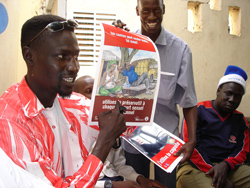You are here » Home » Telling Our Story
Success Story
Outreach efforts focus on changing attitudes
of transport workers
Driving Home The Point on HIV/AIDS

Photo: Richard Nyberg/USAID/Senegal
Senegalese taxi driver Daouda Diokh explains to fellow transport workers how the "capote", an informal term for a condom, can save their lives as part of a USAID-financed HIV/AIDS awareness program.
“The training I received has helped me recover the values I had lost, like responsibility and self-esteem,” said Senegalese taxi driver Daouda Diokh, who also does HIV/AIDS prevention outreach.
Bad news travels fast, but bad blood can travel even faster. That’s why USAID and Senegal’s National AIDS Control Program have stepped in quickly to help halt the spread of HIV among high risk and vulnerable groups. Young men and women working in and around Senegal’s transport industry are particularly at risk, not only because they are more mobile, but also because cash and prostitution are everywhere. Even though Senegal’s national HIV prevalence is relatively low (at 0.7%), the rate among local transport workers, fishermen, and sex workers specifically is much higher.
Taxi driver Daouda Diokh is one of 25,500 transport workers USAID-supported behavior change and HIV prevention activities reaches. Through them, USAID encourages people to take advantage of voluntary counseling and testing.
After finishing high school, Daouda joined the army but quit in 1988. In the army, a fear of being thrown in jail for contracting a sexually transmitted disease encouraged his condom use, a practice he stopped upon leaving the military. “I ended up getting a venereal disease and first consulted a medicine man and then a doctor. I came to realize that knowledge alone will not bring about change,” he said.
Concerned about the risks of contracting diseases, Daouda started working for HIV/AIDS prevention in the capital, Dakar. Now he urges others to change their behavior. “It has not been easy to convince my peers to volunteer to take an HIV/AIDS test. I could not advise them to do so without doing it first myself. So I did. Afterwards, I convinced my wife and 55 young minibus apprentices to follow suit, and they are now proud that they know their HIV/AIDS status.”
Through his outreach efforts, he supports a network of 2,500 cart drivers and hundreds of artisans, and hands out about 70 condoms to female sex workers nightly. His wife also got involved, drumming up the participation of 10 women’s groups to discuss HIV/AIDS testing and mother-to-child transmission. “I have learned a lot about AIDS and life in our society,” said Daouda. “The training I received has helped me recover the values I had lost, like responsibility and self-esteem. “
Print-friendly version of this page (533kb - PDF)
Click here for high-res photo
Back to Top ^ | 

